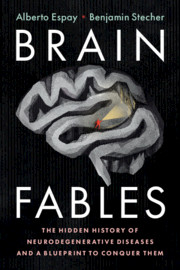Book contents
- Brain Fables
- Brain Fables
- Copyright page
- Dedication
- Contents
- Preface 1 – The Question
- Preface 2 – Enter Patient
- Acknowledgements
- Special Thanks from Benjamin Stecher
- Chapter 1 The Shaky Six and the “Second Reality”
- Chapter 2 Pieces of a Puzzle?
- Chapter 3 Disease “Redefinition”: A Tough Pill to Swallow
- Chapter 4 Disease Subtypes: The Promise and the Fallacy
- Chapter 5 Protein Paradox
- Chapter 6 The Fault in Our Models
- Chapter 7 Biomarkers: The Promise and the Fallacy
- Chapter 8 Lessons from Oncology
- Chapter 9 Symptomatic vs. Disease-Modifying Therapies
- Chapter 10 The Hypothesis That Refuses to Die
- Chapter 11 Our Living Dissonance
- Chapter 12 The Scientific and Lay Narratives
- Chapter 13 Challenges Viewed from Afar
- Chapter 14 The Moonshot: Population-Based Studies of Aging
- Chapter 15 Predictions for the 2020s and Beyond
- Epilogue
- Note Added at Press Time – Reviving LOF
- References
- Index
Chapter 7 - Biomarkers: The Promise and the Fallacy
Published online by Cambridge University Press: 29 June 2020
- Brain Fables
- Brain Fables
- Copyright page
- Dedication
- Contents
- Preface 1 – The Question
- Preface 2 – Enter Patient
- Acknowledgements
- Special Thanks from Benjamin Stecher
- Chapter 1 The Shaky Six and the “Second Reality”
- Chapter 2 Pieces of a Puzzle?
- Chapter 3 Disease “Redefinition”: A Tough Pill to Swallow
- Chapter 4 Disease Subtypes: The Promise and the Fallacy
- Chapter 5 Protein Paradox
- Chapter 6 The Fault in Our Models
- Chapter 7 Biomarkers: The Promise and the Fallacy
- Chapter 8 Lessons from Oncology
- Chapter 9 Symptomatic vs. Disease-Modifying Therapies
- Chapter 10 The Hypothesis That Refuses to Die
- Chapter 11 Our Living Dissonance
- Chapter 12 The Scientific and Lay Narratives
- Chapter 13 Challenges Viewed from Afar
- Chapter 14 The Moonshot: Population-Based Studies of Aging
- Chapter 15 Predictions for the 2020s and Beyond
- Epilogue
- Note Added at Press Time – Reviving LOF
- References
- Index
Summary
Neurology journals have been flooded with review articles on biomarkers and “precision medicine.” Many start with the standard disclaimer that a major challenge for the development of biomarkers is the numerous biological processes responsible for Parkinson’s and Alzheimer’s diseases. One such disclaimer goes like this: “ … [finding a biomarker or a drug to work on all Parkinson’s patients] is wrong because (1) Parkinson’s disease is not a single disease, and (2) no two individuals have the same biological makeup.” So far so good. However, the very next paragraph starts with: “Now let us summarize the work done to date on validating biomarkers of progression for Parkinson’s disease.” No further mention is made of which disease these efforts pertain to. (Presumably all!) These articles invariably surrendered to the luring power of sophisticated analytic methodologies to overcome the shortcomings mentioned in the disclaimer.
- Type
- Chapter
- Information
- Brain FablesThe Hidden History of Neurodegenerative Diseases and a Blueprint to Conquer Them, pp. 71 - 80Publisher: Cambridge University PressPrint publication year: 2020



